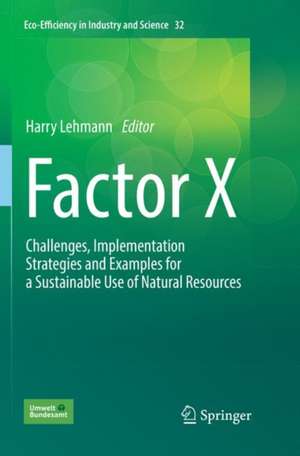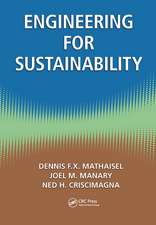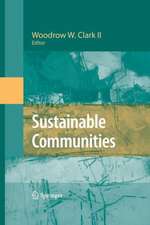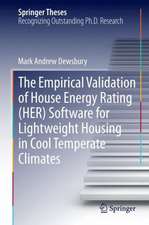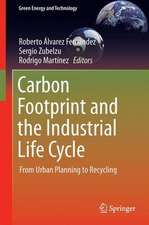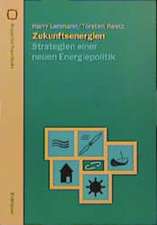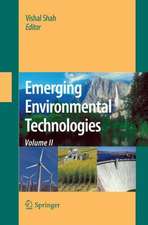Factor X: Challenges, Implementation Strategies and Examples for a Sustainable Use of Natural Resources: Eco-Efficiency in Industry and Science, cartea 32
Editat de Harry Lehmann Contribuţii de Mandy Hinzmann, Nick Evans, Terri Kafyeke, Stephen Bell, Martin Hirschnitz-Garbersen Limba Engleză Paperback – 22 aug 2018
Following on from two previous titles published on Factor X by the Umweltbundesamt (German Environment Agency), entitled “Factor X: Policy, Strategies and Instruments for a Sustainable Resource Use” (2013) and “Factor X: Re-source – Designing the Recycling Society” (2014), this book further investigates how savings in natural resources and resource efficiency improvements could be achieved, focusing on good practice examples that cover different resource categories, pursue different efficiency strategies and come from different sectors, e.g. innovative products or services, technology, man
agement approaches, systemic approaches, etc. The background against which this work is done has a highly comprehensive span, from the first Declaration of the Factor X Club in the nineties, to the European Commission’s Roadmap to a Resource Efficient Europe that was published in September 2011, through to the German Federal government’s German Resource Efficiency Programme (ProgRess I and II) in 2012 and 2016, the G7 Alliance for Resource Efficiency, and most recently the development and implementation of the Sustainable Development Goals (SDG).
| Toate formatele și edițiile | Preț | Express |
|---|---|---|
| Paperback (1) | 574.12 lei 38-44 zile | |
| Springer International Publishing – 22 aug 2018 | 574.12 lei 38-44 zile | |
| Hardback (1) | 590.94 lei 38-44 zile | |
| Springer International Publishing – 18 oct 2017 | 590.94 lei 38-44 zile |
Din seria Eco-Efficiency in Industry and Science
- 9%
 Preț: 901.52 lei
Preț: 901.52 lei - 18%
 Preț: 951.29 lei
Preț: 951.29 lei - 15%
 Preț: 640.24 lei
Preț: 640.24 lei - 15%
 Preț: 654.77 lei
Preț: 654.77 lei - 15%
 Preț: 648.42 lei
Preț: 648.42 lei -
 Preț: 391.61 lei
Preț: 391.61 lei - 15%
 Preț: 642.51 lei
Preț: 642.51 lei - 15%
 Preț: 643.34 lei
Preț: 643.34 lei - 18%
 Preț: 957.62 lei
Preț: 957.62 lei - 18%
 Preț: 953.35 lei
Preț: 953.35 lei - 18%
 Preț: 1238.74 lei
Preț: 1238.74 lei - 18%
 Preț: 1224.68 lei
Preț: 1224.68 lei - 18%
 Preț: 963.15 lei
Preț: 963.15 lei - 18%
 Preț: 2115.07 lei
Preț: 2115.07 lei - 18%
 Preț: 1388.53 lei
Preț: 1388.53 lei - 18%
 Preț: 1861.27 lei
Preț: 1861.27 lei - 18%
 Preț: 1234.94 lei
Preț: 1234.94 lei - 15%
 Preț: 643.00 lei
Preț: 643.00 lei - 15%
 Preț: 647.40 lei
Preț: 647.40 lei - 18%
 Preț: 1222.01 lei
Preț: 1222.01 lei - 15%
 Preț: 637.59 lei
Preț: 637.59 lei - 15%
 Preț: 648.42 lei
Preț: 648.42 lei - 15%
 Preț: 646.62 lei
Preț: 646.62 lei - 15%
 Preț: 645.79 lei
Preț: 645.79 lei - 20%
 Preț: 590.94 lei
Preț: 590.94 lei
Preț: 574.12 lei
Preț vechi: 717.65 lei
-20% Nou
Puncte Express: 861
Preț estimativ în valută:
109.87€ • 114.06$ • 91.61£
109.87€ • 114.06$ • 91.61£
Carte tipărită la comandă
Livrare economică 18-24 martie
Preluare comenzi: 021 569.72.76
Specificații
ISBN-13: 9783319843124
ISBN-10: 3319843125
Pagini: 452
Ilustrații: IX, 452 p. 75 illus., 70 illus. in color.
Dimensiuni: 155 x 235 mm
Ediția:Softcover reprint of the original 1st ed. 2018
Editura: Springer International Publishing
Colecția Springer
Seria Eco-Efficiency in Industry and Science
Locul publicării:Cham, Switzerland
ISBN-10: 3319843125
Pagini: 452
Ilustrații: IX, 452 p. 75 illus., 70 illus. in color.
Dimensiuni: 155 x 235 mm
Ediția:Softcover reprint of the original 1st ed. 2018
Editura: Springer International Publishing
Colecția Springer
Seria Eco-Efficiency in Industry and Science
Locul publicării:Cham, Switzerland
Cuprins
Degrowth.- Circular Economy.- Justice, Equitable Access to Resources, Topic of Refugees.- Financial System.- Educational System.- Repair, social innovation.- Planetary boundaries revision.- International challenges for a resource efficient world.- Necessities for a resource efficient Europe.- Megatrends.- UBA Resource Commission.- Data, indicators, targets (material, water, land) .- Critical resources.- India (National Resource Panel) .- Implementing resource efficiency in Europe.- Circular economy (package) .-Nexus.- The resource efficiency agenda in Germany (incl. German regions) .- NL-Regional Examples.-International, Good Examples („Resource EfficienzY -Atlas“).- Finland Households.- Austria Life Cycle Tower.- Examples from the European Network of Resource Efficiency Agencies (ERF 2014, Focus: cleaner production) .- Resource Panel Indien, Gebäude Beispiel New Dehli.- Factor X housing (system-approach, regional solutions) .- Resource efficient design.- Product Service Systems, Design.- Urbaner Umweltschutz mit Schwerpunkt Stoffströme/Metabolismen in der Stadt.- Sustainable Chemistry, Chemistry-leasing.- Additional: Statements in in Laudato si (Pope’s Environmental Enzyclica) concerning resources.
Notă biografică
Harry Lehmann, General Director, Environmental Planning and Sustainability Strategies, Federal Environment Agency (UBA), Germany
A physicist, Dr. Harry Lehmann has been General Director of Division I “Environmental Planning and Sustainability Strategies” of the German Federal Environment Agency since 2004. He was an early member, and is now the President, of the Factor 10 Club for resource productivity and sustainable use of natural resources. He is one of the founders of Eurosolar, the European Association for Renewable Energy. In 2011 he became Executive Chairman of the World Renewable Energy Council. He has published several books. Since 1985, Harry Lehmann has lectured at various universities, most recently at the Leuphana University of Luneburg.
A physicist, Dr. Harry Lehmann has been General Director of Division I “Environmental Planning and Sustainability Strategies” of the German Federal Environment Agency since 2004. He was an early member, and is now the President, of the Factor 10 Club for resource productivity and sustainable use of natural resources. He is one of the founders of Eurosolar, the European Association for Renewable Energy. In 2011 he became Executive Chairman of the World Renewable Energy Council. He has published several books. Since 1985, Harry Lehmann has lectured at various universities, most recently at the Leuphana University of Luneburg.
Textul de pe ultima copertă
This book describes and analyses necessities for a more resource-efficient world. It discusses solutions for a more sustainable use of natural resources, addressing decision-makers and experts from the fields of policy development, industry, academia, civil society, and the media. The book presents strategies, concrete ways and examples of achieving more sustainable resource use in practice.
Following on from two previous titles published on Factor X by the Umweltbundesamt (German Environment Agency), entitled “Factor X: Policy, Strategies and Instruments for a Sustainable Resource Use” (2013) and “Factor X: Re-source – Designing the Recycling Society” (2014), this book further investigates how savings in natural resources and resource efficiency improvements could be achieved, focusing on good practice examples that cover different resource categories, pursue different efficiency strategies and come from different sectors, e.g. innovative products or serv
ices, technology, management approaches, systemic approaches, etc.The background against which this work is done has a highly comprehensive span, from the first Declaration of the Factor X Club in the nineties, to the European Commission’s Roadmap to a Resource Efficient Europe that was published in September 2011, through to the German Federal government’s German Resource Efficiency Programme (ProgRess I and II) in 2012 and 2016, the G7 Alliance for Resource Efficiency, and most recently the development and implementation of the Sustainable Development Goals (SDG).
Caracteristici
Discusses the scientific challenges of the topic of a sustainable resource use in the context of current developments in society and politic Complements the two previous Factor X publications and presents about 20 concrete examples to increase resource efficiency and reach a “Factor X” (good and best practice) Benefits researchers, policy makers and politicians who work in the field of resource efficiency and sustainable resource use
